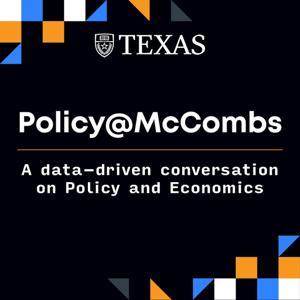Show Notes
Welcome to the second episode of Free Lunch! This week featured Carlos, Greg, Scott, and Steve talking about poverty, homelessness, the minimum wage, and measurement issues. As Greg notes at the end, if you think we’ve missed something please email us at [email protected].
Free Lunch is part of the Texas Podcast Network -the conversations changing the world -brought to you by the University of Texas at Austin. The opinions expressed in this podcast represent the views of the hosts, and not of the University of Texas at Austin.
Salem Center Events Referenced
Valentin Bolotnyy and Natalia Emanuel’s excellent paper “Why Do Women Earn Less Than Men? Evidence from Bus and Train Operators” and Bolotnyy’s Salem Center presentation David Neumark’s talk on poverty and the minimum wageBruce Meyer’s talk on measuring poverty and the interagency reportJudge Glock’s talk on street homelessness in Texas
Poverty/Minimum Wage
President Biden signed an executive order that raised the minimum wage for federal contractors to $15/hour; in signing the order, he stated “I believe no one should work full time and still live in poverty. That’s why today, I raised the minimum wage to $15 an hour for people working on federal contracts.” Given this background, our conversation is organized around the question: suppose you were Joe Manchin and had the power to basically set the minimum wage anywhere between $7.25 and $15.
Minimum Wage Literature
David Neumark’s latest paper “Myth or Measurement: What Does the New Minimum Wage Research Say about Minimum Wages and Job Loss in the United States?*”Arin Dube’s literature review for the UK government on the effects of raising the minimum wage Table 2 from Joseph Sabia’s paper “Minimum Wages: An Antiquated and Ineffective Antipoverty Tool” is the source of the claim that raising the minimum wage would primarily benefit families with earnings three times the poverty line The poverty line for a household with three people is $21,960 https://www.census.gov/data/tables/time-series/demo/income-poverty/historical-poverty-thresholds.htmlA cool paper that none of us mentioned is Orly Ashenfelter et al’s new piece “Wages, Minimum Wages, and Price Pass-Through: The Case of McDonald’s Restaurants”
Minimum Wage Additional Context/Stats
David Neumark notes that helping low-wage workers is not conceptually the same as helping those in poverty This distinction is important because the benefits of an increase in the minimum wage alone (i.e. without any other interventions) will mostly accrue to households above the poverty line The above is not to say that many below the poverty line won’t benefit or that policymakers should or should not raise the minimum wage it’s to point out that there are tradeoffs that politicians and voters need to considerThe highest minimum wage is in Geneva, Switzerland, where the minimum wage is $25/hour as of September 2020Highest national minimum wages are equivalent to $13.40 USD / hour in Australia and Luxembourg (based on 2019 prices and converted into US dollars)Countries with minimum wages close to the US include Israel at $8/hour and Korea at $7.20 an hour. Denmark, which has been in the national debate recently for their relatively cheap big macs and relatively generous wages paid to McDonald's workers, does not have a minimum wage but has an entirely different labor system called “flexicurity”. The system is basically the combination of a right to work state with strong unions, generous social insurance, and universal healthcare. The highest minimum wage is in Geneva, Switzerland, where the minimum wage is $25/hour as of September 2020Highest national minimum wages are equivalent to $13.40 USD / hour in Australia and Luxembourg (based on 2019 prices and converted into US dollars)Working a full time (40 hours/week) job 50 weeks a year at $15/hour would make you $30,000. At $7.25 the comparable figure is $14,500.Median household inc




























